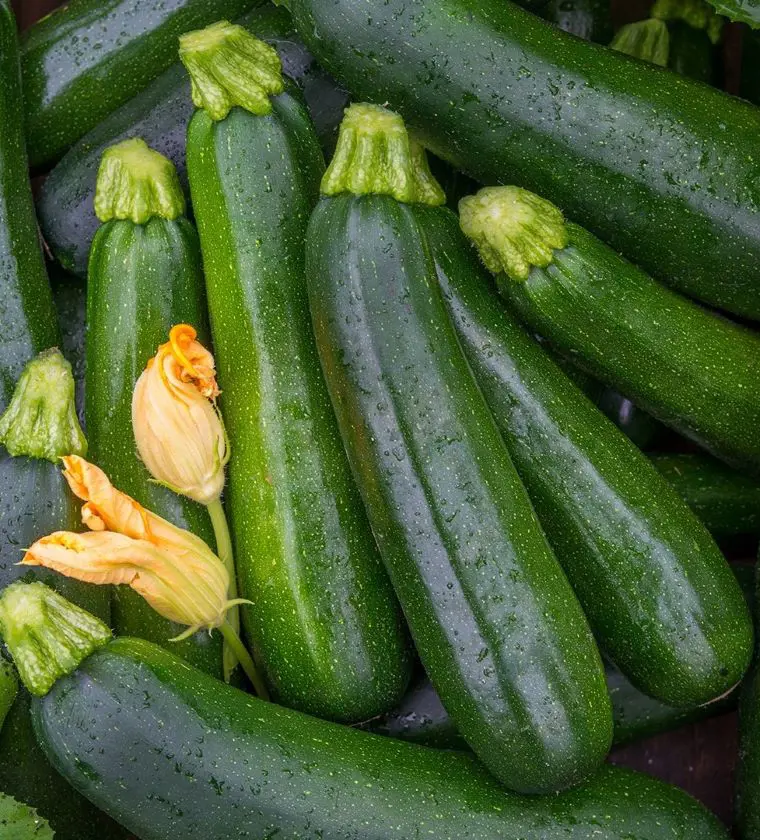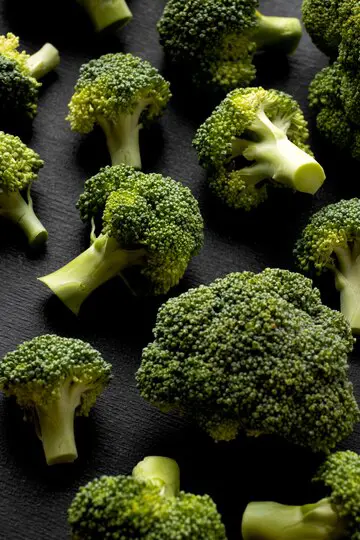How To Store Onions
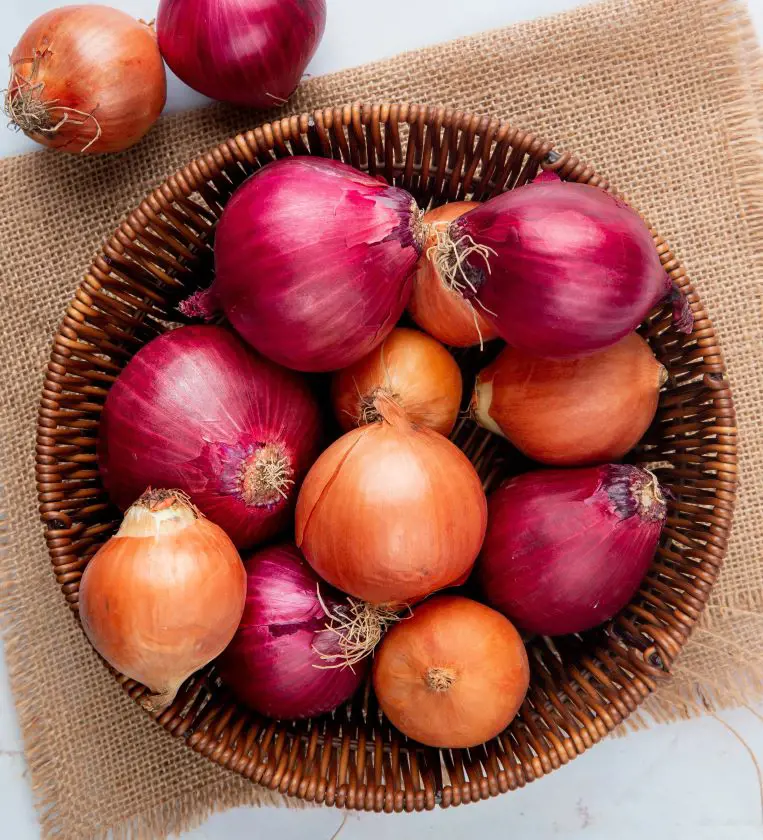
This post may contain affiliate links. If you make a purchase through links on our site, we may earn a commission.
Onions, the most useful culinary companions are a staple in all kinds of recipes. Available all year, these are a crucial ingredient for every house kitchen.
However, to make them last longer, they should be stored at a favorable temperature or in a well-ventilated container, such as a wire basket or an open paper bag. These are the 10 best ways:
1. Dry Onion Skin
Once onions are harvested, it is crucial to let them dry so that their outer skin does not remain wet. Storing wet onion might encourage its premature sprouting or increase the probability of early rotting. Hence, the curing process helps shallot form a protective layer on the outside, contributing to their longer storage. The drying period has to be applied for up to two or four weeks.
Regardless of their variety, the drying process applies to every onion including, yellow, white, or green. All these varieties should be dried in a warm and breezy environment where no sunlight and humidity can enter.
2. Cool And Dark Room

The space for storing dry onions should be cool and dark, with a temperature between 40 to 50 degrees. Many of us have a practice of placing these vegetables in a root cellar or basement area of our home, but this idea is wrong. When your room is too warm, they will begin to sprout. On the contrary, if you choose too cold space, your onions will start to rot.
Spices like shallot are best kept in cool and dark areas to prolong their shelf life. Raw bulbs, stored in such conditions, can last 4 to 5 months. Thus, favorable spots for this type of storage could be your pantry, garage, or unheated basement.
3. Dry Storage Area
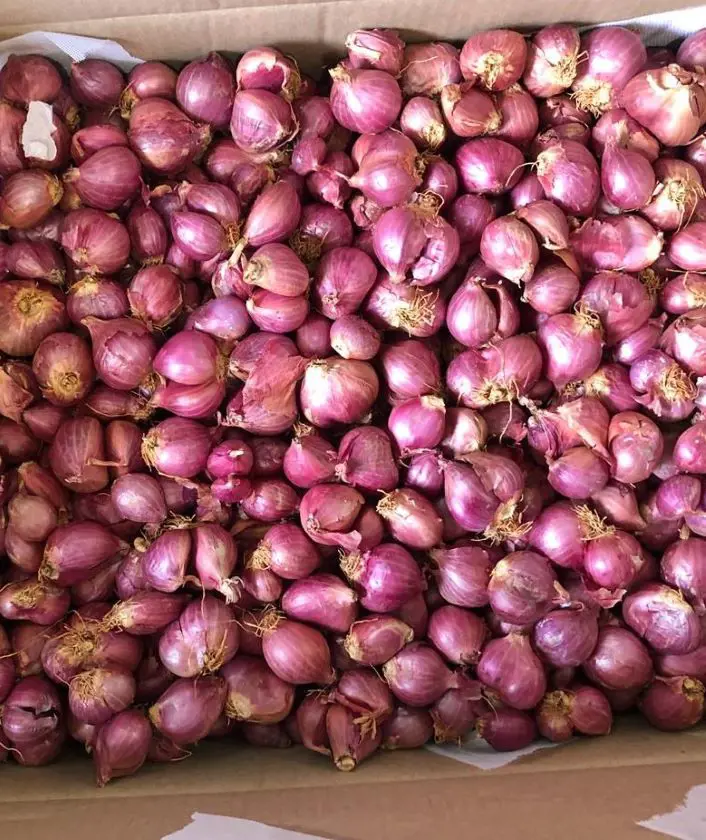
If you are thinking of keeping your red onions up to winter, then it is necessary to store them in a dry storage area of your home. Without proper curing, your onion may turn soft and mushy, which causes it to spoil and develop a foul smell.
Onions do not like damp and moist places because moisture promotes loss of flavor, mold growth, and shorter shelf life. So, preserving these bulbs in a dry environment helps prevent excess humidity, which is also the leading cause of degrading their quality.
4. Ventilated Space
Proper ventilation is essential for onions as it helps to maintain fresh air and a balanced environment in a room. It helps your onion to remain fresh and healthy. Similar to other vegetables, onion also discharges moisture and natural gas over time. If there is no proper ventilation, then these gas and moisture will increase humidity which can damage them.
Similarly, good ventilation lets these gases disperse quickly. This will prevent the accumulation of dampness that might contribute to mold growth and premature sprouting of your bulb. Ventilation further creates ideal storage conditions, and this will aid in preserving their flavor and quality.
5. Use Perforated Baskets
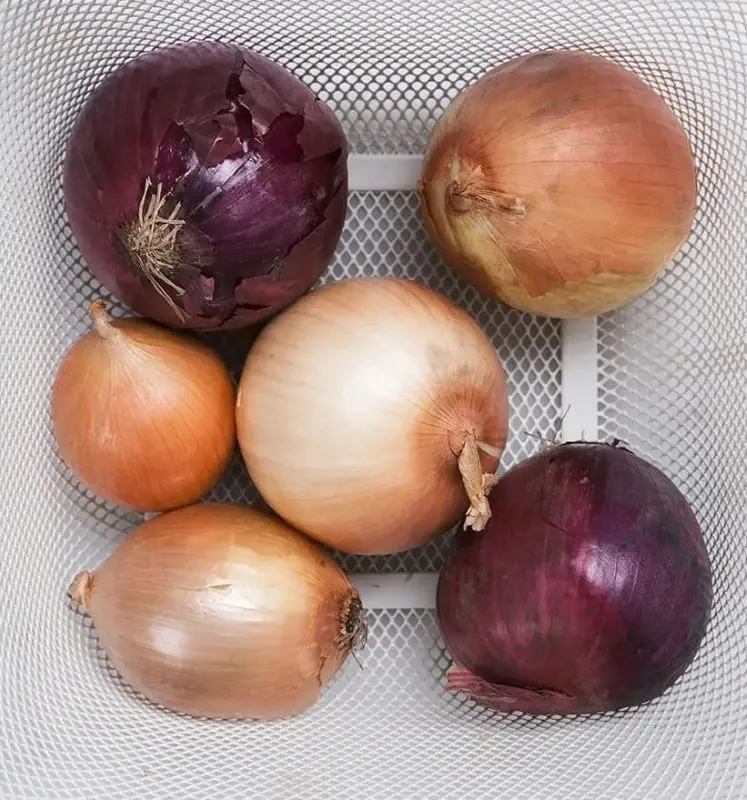
Onions are not stored in cold storage but in perforated baskets that provide good ventilation. Using these bags helps to keep air flowing around the onions and this will prevent them from molding and rotting. You should not store these bulbs in polythene bags, as this can lead to bacterial growth that can impact their overall quality.
Besides perforated baskets, you can use mesh, paper, or even wire bags, where fresh air can properly circulate. Keeping them in any of these bags will preserve your onions for up to 5 to 6 months. Here, you need to avoid using plastic or sealed bags as it will quickly cause spoilage.
6. Store In Pantyhose
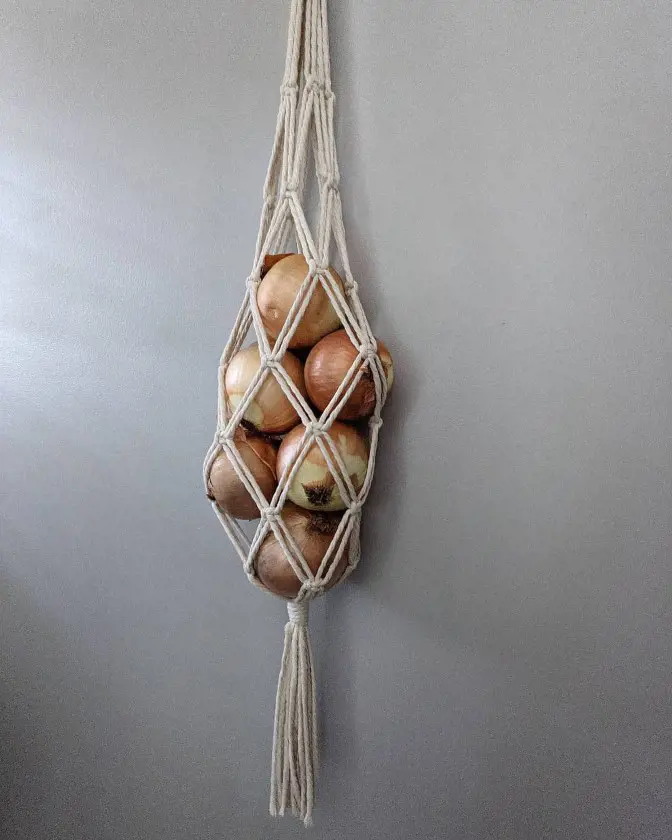
Storing onions in pantyhose is another creative and effective way to keep them fresh. Pantyhose is DIY storage that is usually made from nylon. In this storage technique, each bulb is tied to a pantyhose, placing each of them apart from the others. It will prevent them from spoiling one another, even if one of them goes bad.
It further allows you to take one onion out at a time which makes it easier to use them. If the bulbs are smaller, you can put them together in a single bunch. This will help to monitor and manage your onions efficiently in a limited space. After all these procedures, they should be hung in a cool, dry, and dark room.
7. Avoid Sunlight
The safety and quality of shallots depend upon how you store them. No matter what variety they are, you should choose a cool place away from the sunlight. This is because direct sun exposure may turn your bulb into a condition called greening. Greening is a natural process that occurs when you store your onion in a warm and moist area.
Additionally, the bulb turning green means, it is beginning to sprout. However, it is not harmful to eat but it can taint the taste of onions and make them bitter. The heat created by sunlight and other similar sources also can lead to the growth of spoilage microbes like mold.
8. Keep Onions Away From Potatoes
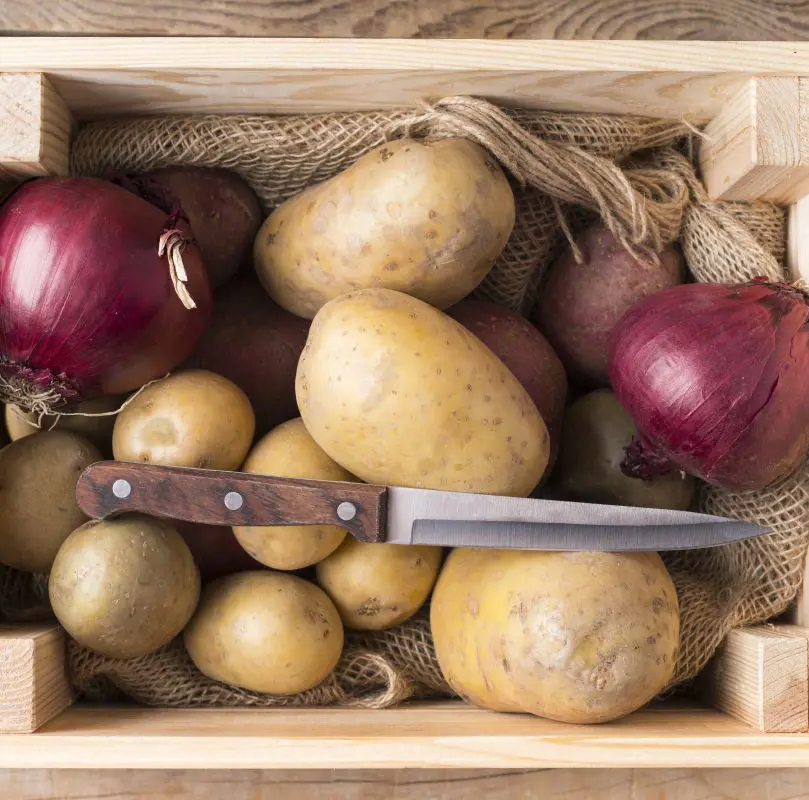
One of the important facts that you may not know about onions and potatoes is that they should not be stored together. Although they both share a similar storage environment, keeping them with each other is a big NO! Placing both of them together may drastically shorten their shelf life as onion emits a type of gas called ethylene which causes potatoes to spoil quickly.
On the other hand, potatoes contain a high amount of moisture, which can lead onions to absorb this moisture. As a result, bulbs may turn mushy and brown, causing them to spoil. So, preserving them a few meters apart in a basket, box, or drawer would be fine.
9. Refrigeration For Cut Onions
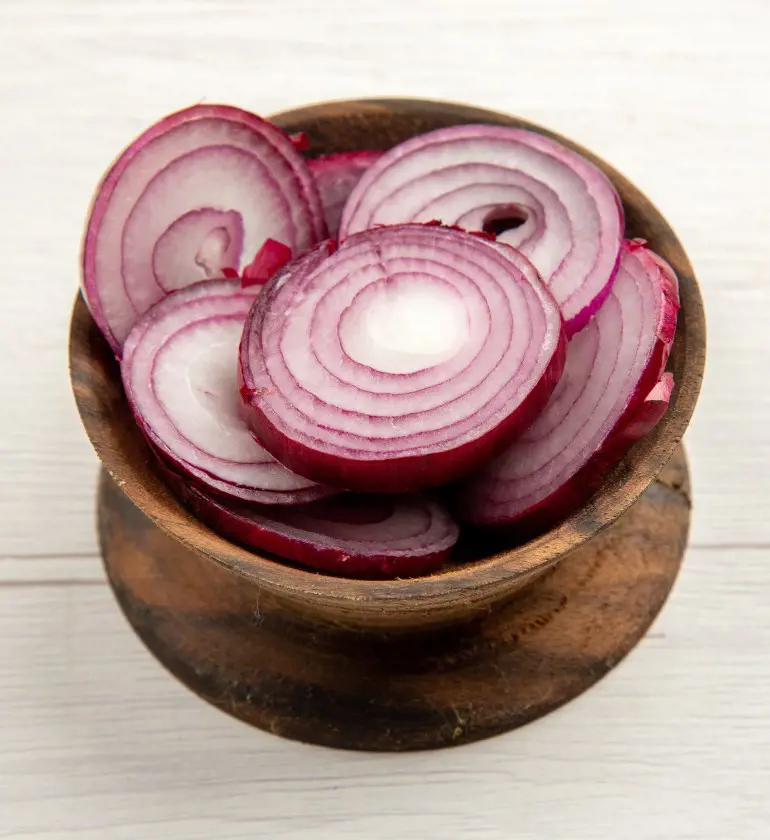
Sometimes it can be challenging to find a cool spot in your home. In this case, it would be better if you store them in a refrigerator for their maximum shelf life. To store onions for a long period, freeze them in an airtight container by chopping or slicing them into pieces. The chopped raw onion will last at least seven to ten days, but its texture may get mushy as it absorbs moisture very easily.
Storing onion in a refrigerator is not recommended normally. As they contain a high amount of water, preserving them in a cold temperature may alter their taste and texture. Hence, you should consider freezing them only when you do not have a proper storage place or when you intend to use them in salads or dishes.
10. Inspect Regularly
It is essential to keep inspecting and monitoring your bulb storage regularly. Since they may turn to rot, sprout, or mold at any time, regular monitoring will help you to prevent spoilage and maintain quality. In addition, checking for symptoms of decay, soft spots, and unusual growth assists in identifying these issues early. And this will contribute to better food safety and lessen the risk of wastage.
Moreover, we can still consume onions that have just started to sprout. But the green parts need to be chopped before using them in any dishes. If you notice your onion getting slimy or discolored, you should avoid eating it.
Recent posts
How To Store
How To Store
How To Store Zucchini - 9 Tips To Keep Fresh
Zucchini belongs to the Cucurbitaceae family and is a type of summer squash. With its mild flavor and tender texture, zucchini has become a popular ingredient in numerous culinary creations. Zucchini is a sturdy veggie, but to keep it tasting yummy a...
How To Store
How To Store Broccoli So That It Lasts Longer
Broccoli is celebrated for its tasty versatility and shines in dishes like fresh salads, roasted delights, steamed sides, and comforting casseroles. To savor its best flavors, proper storage is crucial. Knowing how long broccoli stays at its best in ...
